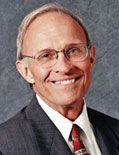Dr. Schellhammer
The other day I interviewed Dr. Paul Schellhammer, a noted urologic oncologist in Virginia Beach, Virginia. Paul is 71 now and is very well known and respected in his field. He is a former president of the American Urological Association. As you can imagine, Paul has treated many men for prostate cancer. All men have a high likelihood of developing it as they age but in the vast majority of cases it is non-aggressive. Increasingly there are men who receive no treatment. It’s simply what doctors call “a finding.” But in 2000 Paul met prostate cancer “up close and personal.” Not only was he diagnosed with it, but as he and a pathologist friend looked at his biopsy under the microscope it was evident his prostate cancer could not be considered “non-aggressive.” And so began another story of a doctor as patient.
Paul began his journey from surgery to radiation to hormonal therapy to clinical trials. While he is not on a trial just now he expects to be in another one in a few weeks. He is living the life of a doctor who knows exactly how his patients feel. Please listen to my interview with Paul where he explains how he processes information about treatments both as a doctor and as a patient. And he shares his advice to others. You’ll hear how he stresses the importance of patients becoming students of their own health condition. He echoes what I always say, that no doctor cares as much about your case as you do or has as much at stake. With the treatment landscape changing in prostate cancer, for example, it’s imperative a man learns all he can with the understanding that he may sometimes know something his busy doctor does not. These days Paul Schellhammer doesn’t see that as a patient being too pushy. He sees it as a requirement for patients today, and he is among them.
One other note about doctors as patients. When I remember, I ask doctors I interview why they became a physician. Not infrequently it is because they experienced an illness themselves or a family member did. Recently, I interviewed Dr. Bart Scott, a noted oncologist and bone marrow transplant specialist. I asked him about his connection with the field. In his case he was in training to be a doctor and then got hit with a life threatening diagnosis – Hodgkin lymphoma. It was after treatment and beating the disease that Bart resumed his medical training, this time directed toward a specialty that treats young adults like him with that same diagnosis. Look for my interview with Bart very soon.
So, as you can see, it would be inappropriate to blindly say “Doctor, you have no idea what I am feeling because you’ve never experienced it yourself.” Because not infrequently, they have.
Wishing you the best of health!
Andrew

